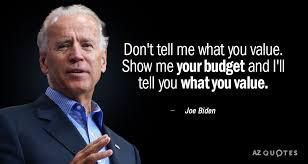
President Joe Biden quote on “show me your budget”
AZquotes.com
President Biden famously said, “Don’t tell me what you value. Show me your budget and I will tell you what you value.” That is truer today more than ever, for more and more people, especially women.
Wealth advisor Kathleen McQuiggan, with over 30 years of experience, told me on my podcast recently that women are “where the wealth of the future is going to come from.” She is a wealth advisor at Artemis Advisors, and previously led the Global Women’s Index Fund at Pax World Investments as head of Global Women’s Investing, after many years at Goldman Sachs.
”Women are increasing their wealth faster than men…Women are going to be inheriting the majority of the wealth in the wealth transfer, because they are living longer…(and) they’re starting companies, they’re starting to move up to positions of power and that higher compensation side of things,” McQuiggan explained.

Marketwatch on women paving way for ESG
Marketwatch.com
And women are more focused on ESG investing – for Environment, Social and Governance-focused – which is one reason why ESG investing is a rising star. Briefly stated, ESG investing evaluates the financial performance of a company, as well as its impact on the environment, how it treats its employees and stakeholders, and the competence, diversity and transparency of its leadership.
Here are ESG-related investing tips from my conversation with McQuiggan.

Kathleen McQuiggan, Wealth Advisor, Artemis Advisors
Kathleen McQuiggan
To summarize it, she said: “Your money is your power – and women need more of both.”
1. Understand what you’re looking at: Reporting on ESG-related issues is a minefield. Attempts are being made to develop one set of reporting standards – such as by a consortium including the World Economic Forum, GRI and the Sustainable Accounting Standards Board – but companies can still choose what they want to disclose and how. That means, companies are likely to report numbers that make them look good, and not report those that don’t.
2. Use the different ratings systems: Moody’s Sustainalytics, MSCI, S&P Global and other financial institutions have ratings they developed, which can be very useful. Asset managers are using these ratings, often collated and compared by Bloomberg and FactSet for example, or develop their own. Make sure you know the source of the data going into the ratings and their methodology.
3. Watch and leverage shareholder actions: Shareholder activism has risen to an entirely new level. Proxy votes and shareholder resolutions are demanding more diversity on boards of directors and/or more disclosure of climate risk, for example. “The more these actions get taken, the more a board of directors and senior management will realize…(shareholders) think it does have financial materiality,” and will pay attention, McQuiggan explained.

ESG factors from BWFA.com
BWFA.com
4. Evaluate each industry separately: “Technology companies, their ESG factors that are important…are different from a retail company, versus an airline,” McQuiggan said. “So, ESG factors need to be scored and ranked based on the impact they have on different industries.”

Screen shot of himforher.org dinner party
Screen Shot of himforher.org dinner party
5. Look for various types of diversity on the board and management team: Study after study shows that diversity drives performance across metrics, from financial, to customer and employee satisfaction, to innovation. “It’s not just women, but…do we have the diversity of perspectives and thought around the decision-making table. It’s by gender, it’s by age, it’s by socio-economic experiences, it’s by someone went to an Ivy League school, someone went to a state school.”
6. Plan for longevity, adjust for the wage gap: The World Health Organization (WHO) reports that women live on average of six to eight years longer than men (some live much longer, like my mom who outlived my dad by almost 30 years). Unfortunately, the wage gap women have had to suffer throughout their careers has cost women dearly too, so they tend to have smaller retirement and investment assets as a result. Adapt your risk tolerance accordingly.

UNSDGs
UN.org
7. Invest in what matters to you: “What do you want your wealth to do for you? What matters to you?,” is the key piece of advice McQuiggan gives. She has noticed that her female clients want to think about returns and impact and legacy. They want to address a societal problem, such as those reflected in the UN’s Sustainable Development Goals. She said her female clients are asking, “How can I as an individual fix them? How can I as an investor fix them?”
“Develop your own philosophy and approach and then understand the partners you’re using and how they’re integrating and implementing things,” McQuiggan advised.
That means, ask for as much information and as many questions as you want and need to make sure you understand where your money is going and that you get what you want.
It’s your money.




